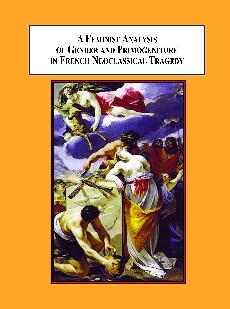This is our backup site. Click here to visit our main site at MellenPress.com
Feminist Analysis of Gender and Primogeniture in French Neoclassical Tragedy

| Author: | Worley, Sharon | |
| Year: | 2012 | |
| Pages: | 364 | |
| ISBN: | 0-7734-2583-7 978-0-7734-2583-5 | |
| Price: | $239.95 | |
In the tradition of Virginia Woolf’s “In Search of a Room of One’s Own,” this study traces the origins of French feminism to Neoclassical theatre and the court of Louis XIV. Through feminist revisionist histories of French literature, the Neoclassical plots and female archetypes from Racine’s Phedre and Andromache, Voltaire’s Brutus (Catherine Bernard) and Marmontel’s Belisarius (Stephanie Genlis) were transposed by women writers and patrons onto actresses and the queens, empresses and mistresses of the French ruling dynasties from Louis XIV- to Napoleon at a time when women were denied the rights of citizenship. Women authors include Bernard, Genlis, Olympe de Gouges and Germaine de Staël, among others. Arguing that emerging feminism is a function of historicism that defines female identity through parallel constructs between regency and theatre, Neoclassicism and modernity, authors of an emerging body of French feminist writings ineluctably reconcile sadist and pacifist incongruities between gendered roles in tragedy.
Reviews
“… a fresh analysis of the origins of French feminism, tracing its genesis to French Neoclassical theatre and the court of Louis XIV. [The author] delves into the reception of key Neoclassical plays during the problematic times of the French Revolution, the Terror and the Napoleonic era.” – Prof. Síofra Pierse, University College Dublin
“… considers feminist trends before their heyday in the twentieth and twenty-first centuries, in a historicized context. … Merging an interest in theatrical, literary, and visual arts, this project helps to show the historical correspondences between the arts.” – Prof. Sarah Lippert, University of Michigan, Flint
“… considers feminist trends before their heyday in the twentieth and twenty-first centuries, in a historicized context. … Merging an interest in theatrical, literary, and visual arts, this project helps to show the historical correspondences between the arts.” – Prof. Sarah Lippert, University of Michigan, Flint
Table of Contents
Illustrations
Foreword by Marie-Emmanuelle Plagnol-Diéval
Introduction
Chapter One: Olympe de Gouges and Marie-Joseph Chénier: Gender and Feminism in Tandem with the Parabola of Revolutionary Politics and French Theatre
Chapter Two: Brutus : The Republican Reversal of Patrician Privilege and the Sublimation of Feminist Political Power
Chapter Three: Setting the Feminist Stage: Stéphanie-Félicité de Genlis’s and Marmontel’s Versions of Belisarius and the Historicism of Revolutionary Politics and Drama in the Future of Empire
Chapter Four: Gender and Primogeniture in Racine’s Andromaque: The Politics of Power, Women, and the State
Chapter Five: Racine’s Phédre as the Criminalized Femme Fatale: Political Representation and the Disjunctive Female Spectator
Chapter Six: Iphigénie: Sacrifice as the Consummation of Dynasty and the Inversion of Female Automnomy
Bibliography
Foreword by Marie-Emmanuelle Plagnol-Diéval
Introduction
Chapter One: Olympe de Gouges and Marie-Joseph Chénier: Gender and Feminism in Tandem with the Parabola of Revolutionary Politics and French Theatre
Chapter Two: Brutus : The Republican Reversal of Patrician Privilege and the Sublimation of Feminist Political Power
Chapter Three: Setting the Feminist Stage: Stéphanie-Félicité de Genlis’s and Marmontel’s Versions of Belisarius and the Historicism of Revolutionary Politics and Drama in the Future of Empire
Chapter Four: Gender and Primogeniture in Racine’s Andromaque: The Politics of Power, Women, and the State
Chapter Five: Racine’s Phédre as the Criminalized Femme Fatale: Political Representation and the Disjunctive Female Spectator
Chapter Six: Iphigénie: Sacrifice as the Consummation of Dynasty and the Inversion of Female Automnomy
Bibliography
